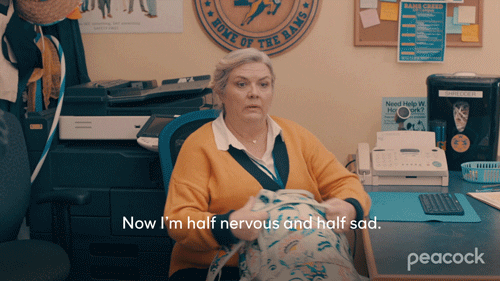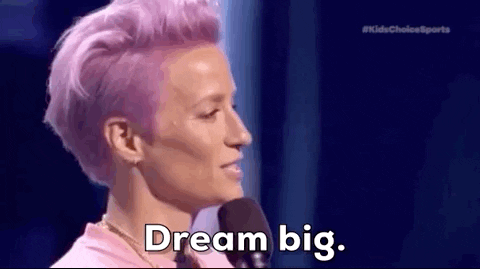A couple of times last year I spoke with elementary and middle school teachers about their fears going into the school year teaching remotely and in person, and how they were making do as the year progressed. Today I followed up with some of the ones I spoke with to hear their thoughts as the kids wrap up the year. (Just a note that these are Midwest-based educator friends of mine, which doesn’t represent every experience.)
***
From a suburban middle school teacher:
“It went a lot better than I feared because we had space, honestly, to keep the kids 6 feet apart. My district is insanely privileged. They rented out an entire leisure center and made that the kindergarten/1st grade center. Also, know that I teach highly motivated kids so even the kids who were fully remote I would say, 80% of those kids still got a lot of it.
The hardest thing was we had to redo every assessment and a lot of our curriculum. There were also teachers in the building who got sick. I didn’t. Here’s the thing—they’re going to cover their asses. They’ll say ‘No one got COVID from being at school.’ How do you know? You can’t say that! Many people didn’t know where they got it. They did contact tracing kind of, and a lot of kids who got COVID got it from hockey.”
**

**
From a Chicago public school teacher:
“The year was probably as hard as I anticipated-- partially because stuff kept changing, partially because of the rhetoric in the media/Twitter about teachers/unions (I know I shouldn't look, but I do), and honestly because kids started to fade out, and I was never sure of the best path to deal with it. In a typical year, I can speak to the student directly, but this year--if they logged in and walked away, I had to try and reach out to parents, who also weren't always responsive. I hoped parents didn't think I was picking on their kid, but it got to feel so defeating to say ‘Let's all do this together, write down what I am writing, let's talk it out’ -- and have students have blank documents.
I loved developing relationships with my students. We played ‘Bop or Flop’ at the beginning of every class and it was SO much fun (I would play a song and they would rate it). Kids would say ‘Oh my MOM is dancing to this one!’ ‘Bop-- but it's clearly a VERY old song’ (about TLC's ‘Waterfalls’ -- ouch!). I also loved how we could joke in the chat.
Honestly, what surprised me was mentally how hard it was when kids didn't show up to their in-person days. ALL this rhetoric about how necessary school is and being in-person is SO important, and kids would stay home: ‘I was tired,’ ‘My mom woke me up late’ etc. I don't know why that particularly was SO hard for me, but it was. Kids who would miss their in-person days to go on vacation: I just didn't get it. Another aspect was feeling like I was working so many jobs at once and still seeing all the chatter about CPS teachers on social media, “Wasted Wednesdays” etc. as we are coming up with all these different ways to reach kids and meet with kids. That was tricky too — the kids who needed the most help were the hardest to reach. And finally, as kids came back, it was so difficult to deal with behaviors that we could have worked through pretty easily in October, but have them pop up in June. If a student hadn't turned on their camera all year, but they come into school at the end of the year and bring some problems with them, but you can't fully intervene because you still have kids at home that aren't fully in the in-person ‘environment’... I just felt out of control at times.
My admin knows that in a normal year there is nothing I won't do to help a student, but even this year they allowed us to admit that sometimes we were stuck. It wasn't our fault if every type of outreach we did wasn't working (even though it still felt awful). My colleagues and husband (who is also a teacher) were also super supportive-- and so were the mental health people at my school (our social workers & counselors) who were so understanding about how teachers were feeling as well. There were also GREAT KIDS and it was SO AMAZING to watch them learn and blossom.
I think I realized how to pare my curriculum down to what really matters. Sometimes I was juggling too much at once and I was able to really decide what was important. I realized how much I get from the ‘casual’ interactions at school-- how much being able to have a quick chat or a hello in the hallway matters. I realized how much a shared space matters & developing a community. I KNOW how much personalized learning and differentiation matters to me—each child needs to be met where they are.
I came from a school/culture (before my current school) that really relied on test scores to judge teachers, and I think not having tests has been SO freeing for me to think about how to help kids grow without being so harsh on myself. I hope we are able to continue to limit standardized tests.
Equity also really matters to me. My kids are going into kindergarten, and in Chicago that means gifted testing and magnet lotteries, and I watch people just hoard opportunities for their kids, and that never mattered to me before and I think now it matters even less. I also realized how much parental narratives matter. My kids are little, but they never minded wearing masks or anything, and I think that's because my husband and I helped them understand how we need to protect each other. It's been interesting to see what parents feel their children are *entitled* to— and often the parents who complain the loudest already have the most, and that has become almost painful for me to witness. (Not to say that privileged people didn't experience hardship during this, but I think a lot of people don't have any perspective).
**

**
From a teacher in Indiana:
“It was not the best year. My school didn’t follow any of the COVID protocols they put in place, stopped reporting cases to the government in October, and it was everyone for themselves most of the school year - making it really difficult. The only good thing about the year were the kids who felt happy to be back at school.”
**
From an elementary school administrator in Chicago's northern suburbs:
The anxiety of last summer with regards to returning to full-day in-person learning was worse than reality. Once we got through the first week or two, I could feel everyone (myself included) relax a little bit about how it would be to completely change our routines and practices in order to prevent the spread of the virus. In retrospect, I still think the fear and anxiety was appropriate in proportion to what was known about the virus at that time, but returning to in-person school went better than we anticipated as we were planning last summer. In July and August of last year, I had so many staff members crying on my Zoom screen or on my phone line, wracked with legitimate fear. When they hung up, I would be the one in tears, also wracked with fear for my staff and my students. That level of anxiety would have been unsustainable for the full school year, so I'm glad to say it reduced by about 10-15%% after we got through the first few weeks of school and didn't experience any school-based virus transmission. We made it through the year with only two cases of someone contracting the virus from another person in our school buildings. Our mitigation plans were followed more consistently than we anticipated.
Kids adapted to masks and social distancing a lot more easily than we anticipated. They respected the rules but weren't paralyzed with fear and anxiety. They were all so happy to be back in school. None of us were prepared for how emotional that would feel for us as worried adults, to have students so openly and obviously thrilled to be back with their friends and in a familiar space and routine, even with the changes that we needed to make in our procedures and our physical spaces to keep everyone safe. Seeing the students thrive, even with physical distancing and masks and no more small groups and rows of desks instead of group tables or clusters of desks together and eating lunch and snack outside on spaced yoga mats even when it was 40 degrees out...that was honestly wonderful to see and more than one of my teachers shared that that is what kept them going.
Parents were so much more challenging than we had naively hoped they would be. We had about 8 weeks of grace and gratitude and "thank you so much for being back in person, we know this is so hard" before the pendulum swung back and we had unrelenting and unwarranted parental concern about academic skill loss. So, so, so many parents came to us and said, ‘My student couldn't do X when they were home with me last spring. I want them to have an IEP or 504 accommodations, and I took them to a private evaluator to confirm that there's definitely something wrong with them that we want you to fix.’ It was honestly so depressing to see such a clear pattern of ‘I spent extended, stressful, uninterrupted time with my child doing things I am not trained to do, and instead of giving myself and my child grace and recognizing that this was a very stressful time that shouldn't be taken as a perfect reflection of anyone's skills and abilities, I took them to a private psychologist to diagnose them with something that is fixable.’ After seeing between 40 and 50 examples of this exact scenario play out over the course of the school year, it started to feel like many parents coped with the lack of control they were feeling by trying to label something, trying to create a 'fixable' problem. Really what 95% of these cases needed was to be back in a school routine with trained teachers and assistants and interventionists, to be back in after-school activities, and to have parents who were able to leave them with a babysitter a couple of times a month. Instead, it led to a dramatic increase in the stress that all of our school staff felt as a result of parent interactions this year compared to a typical year.
Having an administration that recognized what could be let go of this year (for example, switching to a staff meeting email instead of holding monthly staff meetings once the weather would have forced those meetings to go from our lovely courtyard onto a Zoom screen) and offering support for things that couldn't be let go of (stepping in to help individually administer AIMSweb screeners to all of our K and 1st grade students during the chaotic and stressful fall and spring benchmarking periods) helped the morale of our buildings. Families that sent short thank you emails throughout the year kept our staff going; our staff would share those amongst themselves and everyone appreciated hearing sincere thank yous from our buildings' families, even when they weren't the direct recipient. I personally am lucky to have a lot of people in my life who I'm sure will be thrilled when my work venting drops back down to normal levels, as I leaned on them to validate my weekly (or daily) moments of ‘Can you believe this BS!?’
If we had to do it again, I would feel even greater motivation to do whatever we have to do to get our elementary-aged students back into some sort of in-person routine. Seeing how much of a difference that made back in August was powerful. I would also try to do more proactive communication with all district parents about what behaviors are normal and are happening in all of the closed up homes around you right now. I wish for everyone's sake that there is something we could have done to prevent the huge numbers of kids who were sent for psychological and educational evaluation and assessment this year because their parents were panicked and stressed and not meant to be full-time teachers in their living rooms in between meetings for their existing full time jobs.
I definitely realized I need to spend more time in classrooms and with kids during the year. This year my administrative role was conducted almost entirely via Zoom and we purposefully limited the number of classrooms we went into each week so as not to inadvertently be patient zero, spreading things throughout the building. So there were weeks when I would barely have any time with students. After we were vaccinated in the spring and felt more comfortable moving around classrooms, I could tell how much I need to see the work happening in classrooms to remind myself why it's worth it to keep trying to hang in there in the work I'm doing with parents and staff.
End credits
If you are a teacher with thoughts on the last year, the good/bad/surprising, comments are open.
I hope you enjoyed this issue of Evil Witches, a newsletter for people who happen to be mothers. If you are a new subscriber, hi and thank you—some other issues people have liked in the past cover vasectomies, how an Asian American woman is doing, the things our kids make us say all the time, and the emotional journey of realizing what the Summer Salt bathing suit company thinks you want to see and buy.
If you like this newsletter and haven’t yet, please consider supporting this independent, nonsponsored work and joining the subscription level, which gives you extra context and access to fun honest witchy discussion threads talking about things like feeling great relief when your child behaves like a human being, manners, and practical gifts.
If you have already subscribed, thank you. If you have any questions, feedback, or suggestions for the newsletter you can reply right to this email. You can follow us on Instagram here and talk to other witches on Twitter, too.








Teachers are the goddesses who pull the strings of the future, Claire! I loved these interviews!